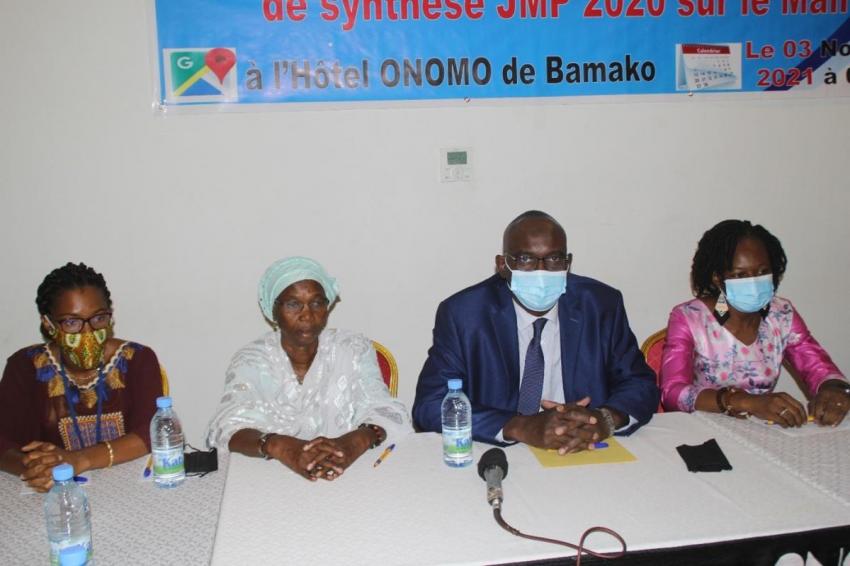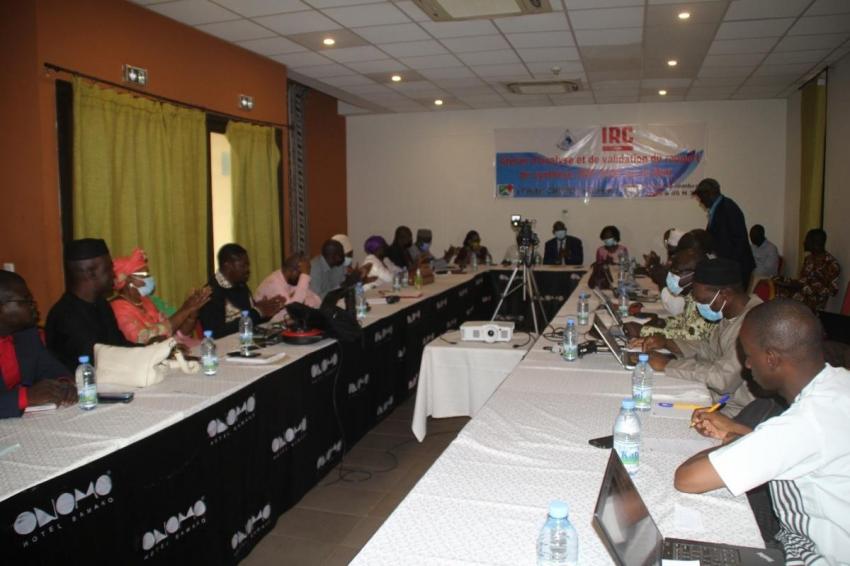IRC has developed a JMP 2020 synthesis report for Mali and is sharing the results with WASH sector actors.
Published on: 29/03/2022
According to Virginie Mahan, UNICEF WASH Specialist, the States have made commitments to achieve SDG 6 and the JMP report, a tool for monitoring these commitments at the global level, deserves to be synthesised and made more accessible to the general public. This clearly underlines the importance of IRC Mali’s initiative.

From left to right, Virginie Mahan Kouadio, UNICEF WASH Specialist, Selly Ouane, representative of the President of CN-CIEPA, Djoro Bocoum, National Director of Hydraulics, Dr. Afou Chantal Bengaly, Country Coordinator of IRC Mali (M. Kané)
Following the example of the other UN member states, Mali has made a commitment to ensure universal access to drinking water, hygiene and sanitation services by 2030. However, 17% and 55% of the Malian population, respectively, still lack access to at least basic drinking water and sanitation services, according to the JMP 2020 report. The WHO/UNICEF Joint Monitoring Programme for Water Supply and Sanitation (JMP) is the official United Nations mechanism for monitoring progress at national, regional and global levels, particularly with regard to the Sustainable Development Goal 6 (SDG) targets on equitable access to safe drinking water, sanitation and hygiene (WASH) for all. Through its global household surveys, JMP analyses help establish the link between drinking water, sanitation and quality of life, and serve as a reference tool to inform policy decisions and resource allocation, particularly at the international level.
The JMP is therefore a key tool for monitoring performance and indicators, and the figures it presents deserve to be known by all and at all levels. With this in mind, IRC Mali felt that it was relevant to produce a summary document of the latest JMP report on Mali. This document summarises the progress made, but also the obstacles faced by Mali in its quest to achieve Sustainable Development Goal 6.
Accessible to the general public and a valuable reference for all actors involved in the water and sanitation sector in Mali, the document was brought to the attention of these actors on 29 October 2021 in Bamako, during an opportunity for collective reflection created by the CN-CIEPA in partnership with IRC Mali.

The exchanges were intense and fruitful (Mr Kané)
In terms of progress, the current coverage rates are 82.5% with an increase of 1.7% per year for drinking water and 45.4% with an increase of 1.5% per year for sanitation. These tangible results show that Mali is ahead of its neighbours, Burkina Faso and Niger, in the coverage of drinking water and sanitation services. While Mali had 83% coverage for basic drinking water services in 2020, Burkina Faso and Niger each had 47%. The same was true for sanitation, 45% (Mali) compared to 22% (Burkina) and 15% (Niger). However, in terms of coverage for basic hygiene services, Niger (23%) outperformed its neighbours Mali (17%) and Burkina Faso (9%).
These figures are a measure of progress, but they are also clear proof that Mali needs a huge effort from all partners to meet the challenge of achieving SDG 6 by 2030. It is therefore imperative to accelerate the current pace and ensure immediate and integrated action to rapidly improve progress on SDG 6.
Representatives of technical services, civil society, the private sector, international NGOs and technical and financial partners of the drinking water, hygiene and sanitation sector, all participated in the exchanges on the results while formulating appropriate recommendations. These included the continuous updating of WASH sector databases, the revitalisation of the sectoral committee for the collection and monitoring of WASH indicators, and the harmonisation of WASH indicators with national indicators.
IRC Mali, through its coordinator, Dr. Afou Chantal Bengaly, reiterated its commitment to the Malian authorities, while remaining true to its mission of bringing together all actors in the sector to promote resilient actions for access to WASH services through learning and influencing.